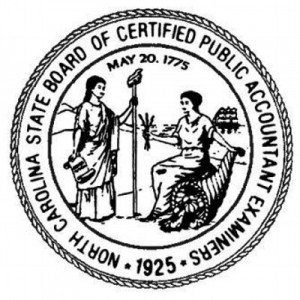Why Hire a CPA?
by Brittany Spragins
When looking to hire an accountant to prepare your taxes or perform an audit, you want to ensure that you select a CPA for several reasons. When you see the CPA designation, you are assured a level of quality that surpasses the average accountant. 
Every state maintains its own standards and criteria for becoming a CPA. According to the NC State Board of Accountancy, the use of the CPA designation is granted only to individuals “who meet the statutory requirements” of NCGS 93-12. These requirements include passing all four sections of the CPA exam, receiving a minimum level of college education with an emphasis in accounting, an accounting law course that covers ethics, professionalism, and professional responsibility, and appropriate work experience. When the CPA submits his or her application, it must be accompanied by 3 letters of recommendation to indicate “good moral character.”
When selecting a CPA, you are assured that,
“a CPA should at all times maintain independence of thought and action, hold the affairs of clients in strict confidence, strive continuously to improve professional skills, observe generally accepted principles and standards, promote sound and informative financial reporting, uphold the dignity and honor of the accounting profession, and maintain high standards of personal conduct.” -www.NCCPABoard.gov
In North Carolina, it is against the law to use the CPA title without the state’s approval that you meet its qualifications. Part of the benefits to the client is that the NC CPA Board establishes consumer confidence since it instills peer reviews of the CPA’s work. It also provides enforcement of professional ethics and code of conduct to ensure client confidence.
Whether you hire Langdon and Company LLP to assist you on a personal or corporate level, you can have the confidence that you are hiring a CPA firm that upholds the highest levels of professional and ethical standards, maintains excellent working knowledge of the tax and assurance current events, and is a focused on a personal relationship with the client.
For more information on CPA’s, you can visit the American Institute of Certified Public Accountants (AICPA) website www.aicpa.org or the NC State Board of Accountancy website www.nccpaboard.gov
Brittany ([email protected]) is a staff member of Langdon & Company LLP’s tax practice. She focuses primarily on high net-wealth individual returns and their closely-held companies.





 , as many as 70% of applicants are expected to be eligible to use this form, not only slashing the time spent by those charities in completing the application but also minimizing the time spent by the IRS in reviewing their files. The electronic filing requirement is also expected to increase the efficiency of the process. An application fee of $400 must be electronically submitted with the application as well.
, as many as 70% of applicants are expected to be eligible to use this form, not only slashing the time spent by those charities in completing the application but also minimizing the time spent by the IRS in reviewing their files. The electronic filing requirement is also expected to increase the efficiency of the process. An application fee of $400 must be electronically submitted with the application as well.